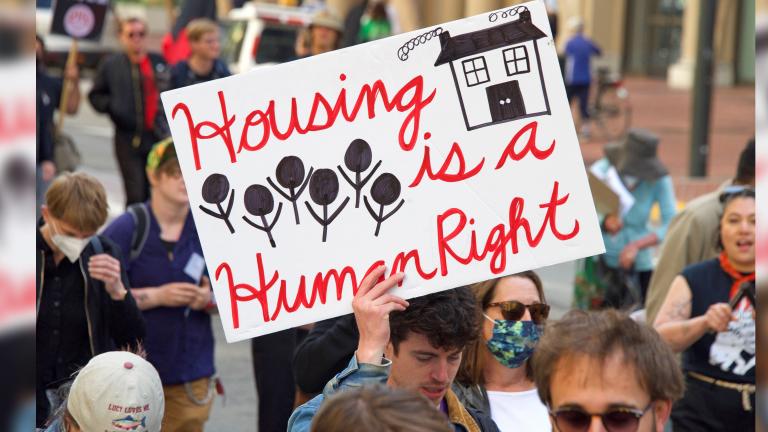The Annual Simces and Rabkin Family Dialogue on Human Rights is presented in partnership with the Canadian Museum for Human Rights and Equitas – International Centre for Human Rights Education.
Housing is a human right
New actions to solve Canada’s ongoing crisis
Wednesday, November 29, 2023
This event has passed.
Tags:

Photo: Sheila Fitzgerald / Shutterstock.com
Event details
- Cost:
- Free
- Location:
- This virtual dialogue will be held on Zoom.
- Language and Accessibility:
- The program will be presented mainly in English with simultaneous interpretation in French and ASL, as well as with English and French captioning.
Video: Housing is a human right: New actions to solve Canada’s ongoing crisis
Canada has recognized adequate, safe housing as a fundamental human right – so why do 25,000+ people sleep on the street, in encampments or in shelters every night?
Join a virtual discussion with community leaders and activists who are breaking new ground to realize the legal right to housing across Canada. The conversation will centre on how discrimination, insufficient supply, inadequate housing, affordability and homelessness intersect.
In 2019, the Government of Canada passed the National Housing Strategy (NHS) Act, legislation that recognizes housing as a human right – a right first recognized 75 years ago in the Universal Declaration of Human Rights. The NHS Act requires the government to implement policies and programs that will ensure everyone can access the right to housing within the shortest possible time. It also commits to a “focus on improving housing outcomes for persons in greatest need” and establishes a Federal Housing Advocate.
Women, gender‐diverse, Two‐Spirit and Indigenous people face particular barriers when trying to access housing, often forcing them into unsafe situations.
Recently, the Women’s National Housing and Homelessness Network – along with its sister organization, the National Indigenous Housing Network – was instrumental in getting the Federal Housing Advocate to request a review into the failure to eliminate homelessness among women and gender‐diverse people.
Emerging opportunities and new approaches will be shared during the dialogue. These range from Housing Assessment Resource Tools aimed at changing the way governments at all levels identify and meet housing needs, to the first‐ever legal challenge based on the NHS Act.
Panelists and their work
Alexandra Flynn is an associate professor at Peter A. Allard School of Law at the University of British Columbia. She is currently leading CMHC and SSHRC‐funded projects focused on Canada’s housing and homelessness crisis. One project developed Housing Assessment Resource Tools. Another, the Balanced Supply of Housing Research Cluster, brings together academic and non‐profit community organizations to research responsive land use practices and the financialization of housing. She is also working on projects related to human rights and tent encampments.
Dr. Kaitlin Schwan is Executive Director of the Women’s National Housing and Homelessness Network and a Senior Researcher at the Canadian Observatory on Homelessness. Her research focuses on homelessness prevention and human rights, particularly for women and youth, and strives to build bridges between evidence, advocacy, policy, and lived expertise to advance housing justice. Previously she was a Senior Researcher for the UN Special Rapporteur on the Right to Adequate Housing and Director of Research for The Shift.
Lavern Kelly brings lived experience working with young people, especially single women and young mothers, in Vancouver’s East Side to advocate for their right to housing. Since 2017, Lavern has been running the Youth Excelling & Attaining Housing (YEAH!) Parenting Program for the Watari Counselling and Support Services. Dedicated to seeing all young people succeed in their lives, she will speak to the challenges and barriers youth face when seeking housing.
Moderator Michael Redhead Champagne is a community leader from Winnipeg's North End with family roots in Shamattawa First Nation. An author, on‐screen personality and sought after public speaker, Michael is a staunch activist and advocate working to eliminate poverty, end homelessness and increase supports for children, youth and families in pursuit of a more compassionate world. He is also committed to Indigenous knowledge, culture and language, and is actively working on reclaiming his Ininew language.
Attendees will have a chance to bring questions and comments following the formal discussion.
This free public event is the fifth annual Simces & Rabkin Family Dialogue on Human Rights, organized by the Canadian Museum for Human Rights (CMHR), Zena Simces and Dr. Simon Rabkin, and Equitas.